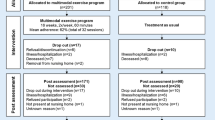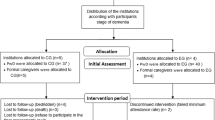Abstract
Background
Studies have demonstrated changes in activities of daily living after an exercise intervention in people with dementia (PWD) living in nursing homes (NH). However, some discrepancies are shown during follow-up.
Aims
Our objective was to measure activities of daily living (ADL) performance during a 6-month observational follow-up after a 6-month exercise or social activity intervention in PWD living in NH.
Methods
After cluster randomisation, 91 PWD living in NH performed a 6-month structured exercise intervention (n = 44) or a social activity intervention (n = 47). After the intervention, 85 PWD were assessed for post-intervention follow-up. Instrumental and basic activities of daily living (IADL, ADL) were measured at 6-month observational follow-up after the intervention using the Alzheimer’s Disease Cooperative Study Activities of Daily Living Inventory for Severe Alzheimer’s Disease (ADCS-ADL-sev) scale (scores ranging from 0 to 51, higher is better).
Results
Compared to participants in the social activity, those who participated to the exercise intervention had a significant decrease of their ADCS-ADL-sev score (between-group adjusted mean difference: 4.6 points, p = 0.001) with IADL having the most decrease (2.8 points, p = 0.004).
Discussion
Unexpectedly, exercisers declined sharply in the performance of ADLs and IADLs, whereas participants in the social intervention group maintained their levels. The potential mechanisms to explain these findings remain still to be elucidated.

Similar content being viewed by others
References
Conradsson M, Littbrand H, Lindelöf N, Gustafson Y, Rosendahl E (2010) Effects of a high-intensity functional exercise programme on depressive symptoms and psychological well-being among older people living in residential care facilities: a cluster-randomized controlled trial. Aging Mental Health 14:565–576
Rolland Y, Pillard F, Klapouszczak A, Reynish E, Thomas D, Andrieu S, Rivière D, Vellas B (2007) Exercise program for nursing home residents with Alzheimer’s disease: a 1-year randomized, controlled trial. J Am Geriatr Soc 55:158–165
Heyn P, Abreu BC, Ottenbacher KJ (2004) The effects of exercise training on elderly persons with cognitive impairment and dementia: a meta-analysis. Arch Phys Med Rehabil 85:1694–1704
Ayalon L, Gum AM, Feliciano L, Areán PA (2006) Effectiveness of nonpharmacological interventions for the management of neuropsychiatric symptoms in patients with dementia: a systematic review. Arch Intern Med 166:2182–2188
Frandin K, Gronstedt H, Helbostad JL, Bergland A, Andresen M, Puggaard L, Harms-Ringdahl K, Granbo R, Hellstrom K (2016) Long-term effects of individually tailored physical training and activity on physical function, well-being and cognition in scandinavian nursing home residents: a randomized controlled trial. Gerontology 62:571–580. https://doi.org/10.1159/000443611
Telenius EW, Engedal K, Bergland A (2015) Long-term effects of a 12 weeks high-intensity functional exercise program on physical function and mental health in nursing home residents with dementia: a single blinded randomized controlled trial. BMC Geriatr 15:158. https://doi.org/10.1186/s12877-015-0151-8
Toots A, Littbrand H, Lindelof N, Wiklund R, Holmberg H, Nordstrom P, Lundin-Olsson L, Gustafson Y, Rosendahl E (2016) Effects of a high-intensity functional exercise program on dependence in activities of daily living and balance in older adults with dementia. J Am Geriatr Soc 64:55–64. https://doi.org/10.1111/jgs.13880
Littbrand H, Lundin-Olsson L, Gustafson Y, Rosendahl E (2009) The effect of a high-intensity functional exercise program on activities of daily living: a randomized controlled trial in residential care facilities. J Am Geriatr Soc 57:1741–1749. https://doi.org/10.1111/j.1532-5415.2009.02442.x
Kolanowski A, Buettner L, Litaker M, Yu F (2006) Factors that relate to activity engagement in nursing home residents. Am J Alzheimers Dis Other Demen 21:15–22. https://doi.org/10.1177/153331750602100109
de Souto Barreto P, Denormandie P, Lepage B, Armaingaud D, Rapp T, Chauvin P, Vellas B, Rolland Y (2016) Effects of a long-term exercise programme on functional ability in people with dementia living in nursing homes: Research protocol of the LEDEN study, a cluster randomised controlled trial. Contemp Clin Trials 47:289–295. https://doi.org/10.1016/j.cct.2016.02.004
de Souto Barreto P, Cesari M, Denormandie P, Armaingaud D, Vellas B, Rolland Y (2017) Exercise or social intervention for nursing home residents with dementia: a pilot randomized, controlled trial. J Am Geriatr Soc. https://doi.org/10.1111/jgs.14947
Galasko D, Schmitt F, Thomas R, Jin S, Bennett D, Alzheimer’s Disease Cooperative S (2005) Detailed assessment of activities of daily living in moderate to severe Alzheimer’s disease. J Int Neuropsychol Soc 11:446–453
Forbes D, Forbes S, Morgan DG, Markle-Reid M, Wood J, Culum I (2008) Physical activity programs for persons with dementia. Cochrane Database Syst Rev 3
Crocker T, Young J, Forster A, Brown L, Ozer S, Greenwood DC (2013) The effect of physical rehabilitation on activities of daily living in older residents of long-term care facilities: systematic review with meta-analysis. Age Ageing 42:682–688
Rolland Y, de Souto Barreto P (2013) Research can improve care in the nursing home. J Am Med Dir Assoc 14:233–235
Booth ML, Owen N, Bauman A, Clavisi O, Leslie E (2000) Social–cognitive and perceived environment influences associated with physical activity in older Australians. Prev Med 31:15–22
Teri L, Gallagher-Thompson D (1991) Cognitive-behavioral interventions for treatment of depression in Alzheimer’s patients. Gerontol 31:413–416
Harmer BJ, Orrell M (2008) What is meaningful activity for people with dementia living in care homes? A comparison of the views of older people with dementia, staff and family carers. Aging Ment Health 12:548–558. https://doi.org/10.1080/13607860802343019
Acknowledgements
We would like to thank Arnaud Lendrieux (Direction de la Recherche et de l’Innovation, CHU-Toulouse) and Yasmine Messaoudi and Aude Letty (Fondation Bien Vieillir Korian) for their work, which contributed to the successful completion of the LEDEN study.
Funding
This work was funded by the Mission Recherche from the Direction de la Recherche, des Études, de l’Évaluation et des Statistiques (MiRE-DREES) (HPA-S4-03) and by the Caisse Nationale de Solidarité pour l’Autonomie (CNSA) (HPA-S4-03) in the call released by the IReSP in 2013. The Centre Hospitalier Universitaire of Toulouse (CHU Toulouse) (14 7292 03) is the sponsor of this study.
Author information
Authors and Affiliations
Corresponding author
Ethics declarations
Conflict of interest
Drs. Armaingaud and Haÿ are both employees of the Korian group. No other conflict of interests is present.
Statement of human and animal rights
The study protocol was approved by the ethics committee (CPP SOOM III), which was registered in a clinical trial registry (registration NCT02444078).
Informed consent
Informed consent was obtained from all individual participants, or their legal representatives, included in the study.
Sponsor’s role
Both the sponsor and funding agencies of the LEDEN study had no role in the design of this study and will not have any role in the execution of the interventions, in the analyses and interpretation of the data, or in the decision to submit results.
Electronic supplementary material
Below is the link to the electronic supplementary material.
Rights and permissions
About this article
Cite this article
Maltais, M., Rolland, Y., Haÿ, PE. et al. Six-month observational follow-up on activities of daily living in people with dementia living in nursing homes after a 6-month group based on either exercise or social activities. Aging Clin Exp Res 31, 361–366 (2019). https://doi.org/10.1007/s40520-018-0984-z
Received:
Accepted:
Published:
Issue Date:
DOI: https://doi.org/10.1007/s40520-018-0984-z




